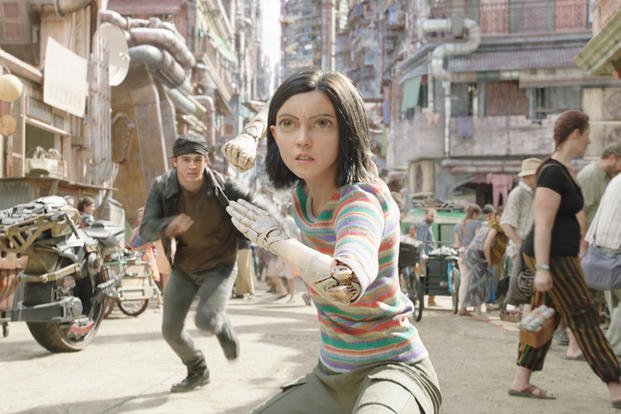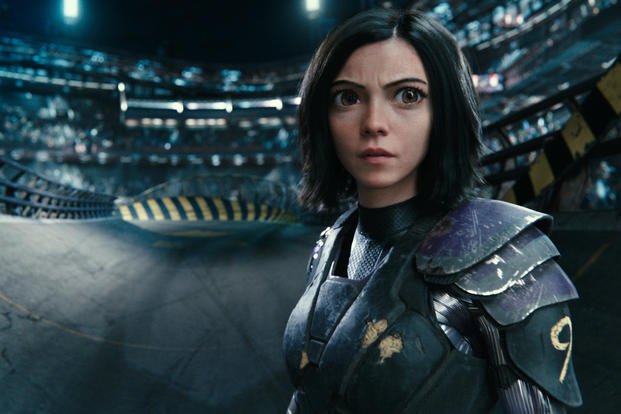"Alita: Battle Angel" is yet another masterpiece of visual effects from the minds of producer James Cameron and director Robert Rodriguez. Cameron has long been a leader in pushing movie technology forward, especially with the original "Terminator" movies and "Avatar," now nearly a decade old and featuring visuals that still haven't been matched.
Rodriguez has long deployed inventive filmmaking techniques at his Troublemaker Studios in Texas, and his "Sin City" movies remain the most innovative comic-based films ever made.
Cameron and Rodriguez have partnered on "Alita," based on the 1990s Japanese manga Gunnm. Cameron has been working on the project for almost 25 years and brought in Rodriguez to make the movie while he continues prep on a series of "Avatar" sequels.
This is one of the rare movies that completely warrants a trip to the the IMAX theater for a viewing in full IMAX 3D. The effects are shocking, and the groundbreaking performance capture techniques used with actor Rosa Salazar allowed Rodriguez to film her on sets with the other actors instead of in front of a green screen for later insertion in post-production.
Cameron wrote the screenplay with Laeta Kalogridis ("Shutter Island"), but you're definitely getting the famous Cameron approach to dialogue here. Even if you're not a fan of that part of his work, "Alita" has the same breathtaking innovation that made "Avatar" a must-see movie.
Cameron and Rodriguez worked closely with Weta Digital to develop the techniques used in "Alita: Battle Angel." Weta is the New Zealand-based visual effects house launched by Peter Jackson for "Lord of the Rings," and it's grown into one of the most important production houses in the world. You've seen its breakthrough work in the contemporary "Planet of the Apes" movies, the "Hunger Games" movies, the "Hobbit" movies, scores of DC and Marvel movies, and "Game of Thrones."
Eric Saindon is an American who emigrated to New Zealand 20 years ago to work on "Lord of the Rings: The Fellowship of the Ring." He's one of Weta's earliest employees, and he worked closely with Rodriguez and Cameron as the visual effects supervisor on "Alita: Battle Angel."
Saindon talked to us about life on the bleeding edge of technology and offers advice to anyone who's looking for a career in the movie effects business.

Are there visual things we're going to see in "Alita: Battle Angel" that we've never seen before?
There's a lot, actually. At Weta Digital, this is the first time we've done a human character. We did Gollum, we did the Apes, we did the Na'vi, we've done a lot of memorable CG characters, but this is a first time we've actually done a total real human.
Well, she's human-ish, right? The big eyes break her away a little bit, and the cyborg body, but it's really the first humanoid character we've put next to other actors that's needed to hold up for an entire movie.
It was a huge challenge for us. Luckily, we had a really good face. Rosa Salazar tied everything together for us. She was able to put a great performance onscreen and, with performance capture, we were able to take her performance and put it onto our Alita character in a way that we captured the nuances of her performance. All put together, it helps us to bring Alita to a living character.
I've seen a couple of clips, and it looks like there's a lot more filming of Rosa on set in context as opposed to shooting her in front of a green screen. That's how this stuff has traditionally been done, right?
There was almost no green screen at all in this film, just a couple of shots for set extensions in Iron City itself. There was no green screen, per se, that we went and shot on, because we really wanted Rosa interacting with the other actors.
We wanted Robert Rodriguez to be able to direct Rosa as if she was just another character in the film. It comes across because she is able to interact, she is able to touch, kiss, all of those other things as she interacts with Christoph [Waltz] and all the other actors.
Because Rosa was on set with them, we got a stronger performance. She wasn't acting to a monitor of a sequence that was shot previously; she was just always there.

Robert Rodriguez is a director who has pushed the technology envelope before, and your producer James Cameron is obviously a pioneer in visual effects. How much of this movie is them giving you the freedom to just run wild? Were they pushing you? What was the collaboration like?
Those guys are both visionaries on all the films they do. Ultimately, the bars they set were so high that it was a little daunting to come onto this film at first. But getting the chance to work with Robert, which I had never done before, and getting to work with Jim again, there's no way you could ever pass that up.
Jim really started artwork on this film in 2005, when Guillermo del Toro introduced him to the manga. He really started doing art all the way back then. So there's a huge inventory of artwork in addition to what [Alita creator Yukito Kishiro has] done for the manga itself.
We worked with Jim and Robert on the vision of what the script was, what the movie was going to be. They let us have freedom with Alita herself, working with the design on how she was actually going to move, that type of thing. They had a really strong vision of what the movie was, so that was the driving force, that's for sure.
Live-action, manga-inspired films have a pretty rough track record up until now. Why does this one work when so many others have failed?
For me, this one works because we stayed very tight to the script. We didn't make it a sci-fi, per se. I don't come away from Alita and think of a sci-fi movie. I think it's a film about a character, about Alita finding herself. It has some sci-fi moments, obviously, with motorball and things like that, but it's not trying to set itself in a crazy future that doesn't exist.
You can picture Iron City as an actual place, you can see yourself there. For some reason, I think that helps ground the whole thing. The whole movie just feels much more grounded than a lot of the other manga-inspired movies, without saying any names.

A lot of our readers are looking for a career after they complete their military service. How does someone get a job like yours?
I went to New Zealand on a six-month contract back in 1999 to work on a little project that I didn't think was gonna really go anywhere because it was by a director who, up to this point, had done a lot of slasher movies. It turns out Lord of the Rings was a little bit of a hit, and I've been there ever since.
What is it about Weta and New Zealand that anchored you on the other side of the world?
Well, Weta is not a small place anymore. When I got there, there were 35 people, and now it's upward of 1,500 people. But it still feels like a really small company. You still know everyone's name walking the hallways, and it's a really nice place to work with a great group that drives. Joe Letteri, Peter Jackson, they're visionaries, both of them, and the company is still run by artists.
That's not something that happens much these days. A lot of the studios out there are run by producers, run by money guys, who are just trying to have the company make a profit. Weta is still run by the artists, and it really shows in the dedication we put into these films. I think that's one of the driving forces that's kept me there for so long.
And then there's New Zealand itself. I grew up in Maine, and New Zealand is sort of like Maine in the '80s. It's very safe. I kick my kids out of the house at 8:30 and they walk to school, and I never worry about it. They can wander the streets, and it's just a very nice, easy place to live.

Weta has attracted a lot of foreigners to migrate to New Zealand from all over the world. Has it changed the culture of the town where you all live?
It's completely changed the culture of the town. We put pins on a map on every country we've hired from, and there were only five or six that didn't get a pin. We've had people from everywhere you can imagine. It's really amazing meeting all of these people and finding out about their cultures and their life, wherever they came from. We have this mix of people, which really makes Weta a fun place to be.
How would someone train themselves so they could get a job working for you?
I came into this field a little bit later because I went to school for architecture. Then I started taking some computer animation courses and just found a little studio in Santa Barbara, and they gave me a job. That's how I got along into this industry.
A lot of people, when they think about getting into the visual effects industry, go straight to a place where they learn the software, and they just try to jump into it. If you want to be an animator, to be the person that puts the motion on the characters, then take some acting classes. The software always changes. The thing that doesn't change is the ability to know how to move, to act. Taking an acting class to be an animator is a great starting point.
If you want to do lighting or compositing, then learn how to be a DP, a director of photography. Learn compositing or take photography classes. Learning the basic skills is the best way to get into this industry. And then learn the software, but every five years all the software changes. Just learning a software isn't a skillset that helps everyone along the most. I think you have to learn the basics behind it first.

Are there any filmmakers or films that have been inspirations for you as you got into your career?
It's funny because the film that got me the most inspired was "The Lion King." And it wasn't even the film, it was the trailer. I remember bringing a date to a movie, and this trailer came on for "The Lion King." It was the entire beginning of the movie, all the way up to where he holds the lion cub up, and that was the trailer. For some reason, that trailer made me start thinking that this would be fun to do, to make movies and make these spectacles for the world to see. I know I should say it was "Star Wars" or something like that, but it was "The Lion King" for me.
I don't know if we're allowed to talk about it, but are you guys working on the upcoming "Avatar" movies?
We have started. We are in progress on starting for "Avatar," but I can't really go too much into that one, unfortunately, because it's so early on.
Are there things coming that we've never seen before when that movie gets released?
Oh, my God, the whole movie is stuff we haven't seen before, everything about it. So, it's going to be a sight to behold, that's for sure.















